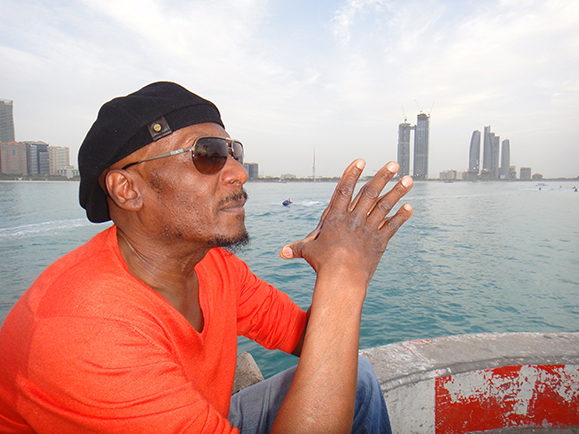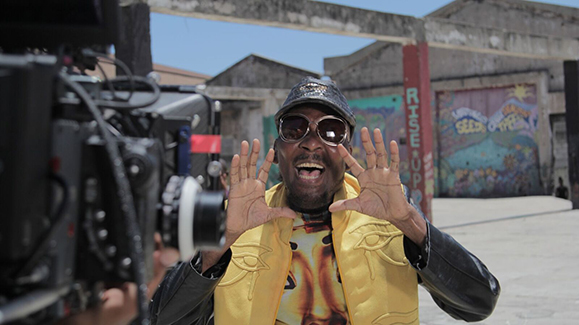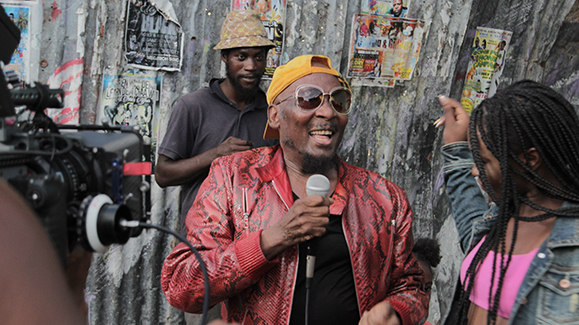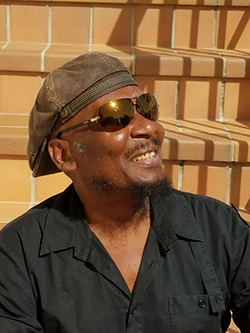Articles about reggae music, reviews, interviews, reports and more...
Interview: Jimmy Cliff (2017)
- Home
- Articles
- Interviews
- Interview: Jimmy Cliff (2017)

Interview: Jimmy Cliff (2017)
"In the whole Jamaican music idiom, I’ve always stayed current with the Jamaican music"
Sampler
Jimmy Cliff is one of Jamaican music’s most outstanding figures. His career has been especially multifaceted, encompassing a range of unusual styles both inside and outside of the reggae spectrum, and he has often been so far ahead of his contemporaries that his output has confounded fans as well as critics. He has also enjoyed one of the longest-running careers in the history of the music and continues to produce innovative work that is relevant to our turbulent present.
Throughout the many phases of his life, which has taken him from Jamaica to England, Brazil, Africa and beyond, Dr Cliff has tried also used his music as a vehicle to address the bigger picture, exploring the place of Mankind in the world and the efforts we must make to improve it, whilst remaining grounded in a spiritual reality that ultimately seeks to connect with the wonders of nature and the forces of good. Far younger than his actual years, with his voice and physical stature in pristine form, Jimmy remains a thoughtful and meditative soul, forging his particular path while remaining open to future unknows.
Presently at work on a new album, tentatively entitled Somerton, Cliff here discusses the album and its initial single, ‘Life,’ released by Zojak Worldwide, as well as aspects of his career and the individual nature of his creative process.

The new single, ‘Life,’ is really a dynamite track musically, and the message of the lyrics are very striking. As usual, you’re bringing in a number of different topics that you’re addressing in the song. So what can you tell us about the song and its message?
Basically the song is about living in the here and now, which is not the easiest thing to do. It is something that I have grown and learned, that the most important thing is the here and now. I have been looking to the future and sometimes considering the past, and there’s always a now and a then, but what I come to understand, the most important thing is the now, and that’s basically what the song is about. Yes, we are kind of a time traveller, travelling through time and all of that, but it’s important to understand, to live here and now.
 The song is about living in the here and now, which is not the easiest thing to do
The song is about living in the here and now, which is not the easiest thing to do
Would you say this understanding has reached you as part of the aging process?
Well, I’m someone who is always seeking after the knowing, to understand and overstand life better, and most of us have questioned, ‘Why am I here? What’s my purpose?’ And some of us realize it at an early stage, and some of us realize it with time, and it becomes more clearer, I suppose, with age, yeah.
It’s one of the aspects of your work that I’ve always appreciated. I’d say there is a real continuum in your work going back to at least the mid-to-late 60s, where you are really looking at the bigger picture, as you say, why is it that we’re here, and what purpose do we have? So again, this song reinforces that continuation within your work.
Yes, that is so. I’m living here and now and really endeavouring to make it better, just a little better every day.
The track was produced by Steven ‘Lenky’ Marsden, very much in contemporary reggae mode, almost with a dancehall flavour to it. Is he someone that you’ve worked with previously?
Previously, we’ve always wanted to work together, but it never came further than doing a remix for me, because at that point in time, he was really hot, and when you’re hot, you’re hot! Everybody wants piece of you, and so it never really worked out. Yet, we know we wanted to do things together, so it’s the first time that we are realizing that dream.
Of course, he’s a keyboard player as well as a producer and a rhythm builder. So the track is very keyboard-dominated you could say, synthesizer driven.
You know, part of my way of going in the music business as well is to stay current, and like you’ve just noticed, it’s really a dancehall feel on this track. And in the whole Jamaican music idiom, I’ve always stayed current with the Jamaican music. There’s one time that a part of the Jamaican music had missed me and I didn’t do any recording of it at that time, because I was residing in the UK; that was the rock steady era.
When you were up here, trying to make it as a soul singer?
Right. When I came to the UK I had to sing soul, I had to sing rock and roll, I had to sing whatever it was, because I really kind of introduced the ska and the reggae to the audiences up there. My band was all British, and I actually showed them how to play the ska, and that was so easy that it was so difficult (laughs).
So it was something that they struggled to get the hang of?
Well, they finally got the hang of it along the way, but in every environment, people are going to put their experience of their environment in it. So it would be like, if you go to Jamaica to get a Jamaican to play, or if you want country and western and you go to Nashville, it wouldn’t be the same as if you go to Canada, you know?

The video that’s accompanying ‘Life,’ it reaffirms the notion about the here and now, it’s about following your dreams, doing what you really believe in. It’s as though you’re saying, take the risk and do it now, rather than regretting it later.
Absolutely, it just may be too late! So never allow it to be too late. I’m here now, do it now! Let’s get it on!
Another thing in the video, there’s the subplot of a Jamaican couple vacationing in their own country, and it reminded me that last February, you were publicly honoured in your home town of Somerton, and it was said that you are spearheading some kind of tourism project in Somerton. Is that something that you’re able to talk about publicly now?
It’s a vision I had a long time ago of Somerton. I’ve always seen Somerton as, it could become a ecotourism place because of the link with Jimmy Cliff and quite a few other things, I mean, quite a few prominent people have come out of that little piece of soil, for what reason, I don’t know. So, it could become a place where people come to Jamaica and want to know something about Jamaica, it could become a place they say, ‘Oh, this happened here, this happened here at this place,’ and I know a few things that will be of interest to people who come from abroad and want to see Jamaica, like there’s a cave I used to go to as a child and that cave, it’s still there, and I think that, OK, I could get horses to ride over there, where I grew for about 5 years of my life with my grandmother. The cave was someplace that we always visited as children, and it was such an interesting place, that I thought, ‘Boy, if we can get horses to ride over there,’ it’s a cool thing for tourists to just ride up those little hills, going, ‘Oh, Jimmy Cliff used to visit that place,’ and then you come up on the cave and they would say, ‘Wow, what a place this is!’ So that would be one feature of being over there, and there’s so many other things that I have in mind, so I’ve always had a vision a long time ago. The little shop that I grew up in where my father was a tailor, I would really turn that into a little museum and get a wax of my father around his sewing machine, and get a wax of myself, doing all my climbing up on all of those things. You know, I have all these visions of Somerton, and it would be so interesting, and I’m not really depending on the government to do it, but I would bring them in at some point in time. But that’s as far as I could say about it right now.

And then, with your new album being titled Somerton, what can you say about your experience of Somerton as a young person?
Well, Somerton meant so much to me—it means everything to me. That’s where I formed my whole vision of my life, who I’m going to be, and everything. My family were farmers, so when I used to move the cows and the goats and all of that, I say, ‘Wow, you know, this life is not for me, man. I’m going to that place and that place,’ and I don’t even know where those places are, I’ve only heard about them. But going to the rivers, it was so wonderful, going up in the hills and cooking with my friends and just hanging out together. It was so natural. And I had such a great time. And when it was time for me to leave to go to Kingston, I couldn’t wait, but it was after I went to Kingston, I realized that, ‘Oh, man, Somerton was great place for me!’ So sometimes you’re in a situation and you don’t know it, until after some time, that you’re not there anymore.
 Somerton meant so much to me, it means everything to me. That’s where I formed my whole vision of my life, who I’m going to be, and everything
Somerton meant so much to me, it means everything to me. That’s where I formed my whole vision of my life, who I’m going to be, and everything
So this album, why is it that you’re choosing to call it Somerton?
There were many ideas of what to do with this album, because originally I went into the studio, not saying I was going to make an album, I was going to cut some singles. So after I completed them, I didn’t have a title for the album, so along the way, Tony Rebel said to me, ‘Why don’t you call it Somerton?’ I said, ‘Wow, what a great idea!’ I also had the title Life in mind, and there was another idea of putting out 2 EPs, because on the album, there’s a set of songs which were like, social, political songs to match the time. For instance, there’s a song on it called ‘Refugees,’ and there’s a song on it called ‘Racism,’ and so on, and ‘Internet.’ They are songs that presently match the time. So we thought we would put out that set, the social, political, conscious songs, and there’s a line I have in the song, ‘Internet,’ called, ‘free for all,’ which means, I’m saying in the song that there was a time when I could hear my music only on the radio, there was a time when I could only see my video star only on the video, there was a time when I could see my favourite star only at the picture show, but now I have them all on the internet, free for all on the internet, you know? So everybody can get them free for all, like this generation, they can download whatever they want. In one way, it’s good and in another way, it’s not so good. Like for me as an artist, well, I don’t sell much CDs anymore. But in another way, I don’t have to rely on a major company to put out my album, so in that sense, it’s good, you know? So I thought, ‘OK, put out that set, call it Free For All, and put out the second set, and call it Love For All,’ because the second set is more about relationships and love and that kind of situation. So there were all of these ideas going around in my head and to be truthful, I still have not decided exactly which one, but I’m still kind of leaning towards Somerton.
When you say that Tony Rebel gave you the idea of calling the album Somerton, was Tony Rebel involved in the album in some way? Or did you just know him through the music fraternity?
We know each other through the music fraternity, and we have mutual respect for each other, and talk a lot about what goes on in the cultural community in Jamaica. So that’s how we knew each other. No, he wasn’t involved.
I see that somebody who is involved is another musician that you’ve had a longstanding working relationship with, which is Clive Hunt, who I understand is basically running sessions at your studio now?
Well, we leased the studio to him via VP for a period of time, yeah.
So he can do his projects there during that time?
Yes, during that period of time.
This material that you’ve been recording yourself, have you been recording it there with him?
Yes, right.
The work you’ve done together in the past has certainly stood the test of time, and he’s always been a very creative and forward-thinking person in terms of his music productions.
Well, he’s somebody with a great ear, no one can take that from him. He has a great ear, and nothing misses him, so that’s important for someone like myself. But I have always been that kind of artist who is an innovator, I always like to stay on top of the thing, so Clive would say, ‘Boy, you know, me stuck inna the 60s,’ cause he likes the 60s reggae, when the traditional reggae was reggae, he kind of loves that period. So sometimes he’s stuck inna the 60s, but when he’s working with me, you can’t be stuck in the 60s, you’ve got to be ready for anything, for anywhere to go. That’s it. So when we did ‘I Can See Clearly Now,’ that one was like the biggest thing we did together, it was first, actually not with Clive at the helm of it, it was with a bass player, Computer Paul, he was at the helm of it and then Clive came in after, because the bass, the drums, the keyboards was him. And then Clive came in after and put all the horns and all of those kinds of things.
Basically you’re saying Clive is old school, but with you, he has to be more versatile?
Exactly. So I pull him out and he pull me out, because he’s got the ear and they have to be spot-on, especially with my vocals. ‘That’s a little flat there, that’s a little sharp there,’ and I love that. You know? Cause I want it to be perfect.
 Certainly, when we look back at your career, you’ve never let yourself be constrained by any format. The majority of what you do is reggae, but you’ve never only just done reggae.
Certainly, when we look back at your career, you’ve never let yourself be constrained by any format. The majority of what you do is reggae, but you’ve never only just done reggae.
Yes, and it cost me a lot in terms of emotional pain. Because not a lot of people understood what I was doing. ‘What’s he doing over there, recording in Muscle Shoals?’ You know? ‘Many Rivers To Cross,’ I mean, ‘What is that?!’ But that’s me. I’m like that. I can’t help being who I am as a creative artist.
Another name mentioned in connection with your new album is someone that I’m not too familiar with, Othneil ‘Ottey’ Lewis.
Ottey is one of the best keyboard players that we have in Jamaica. His base is jazz, but he knows everything about the Jamaican music. He can play you mento, go right back, so if you talk about somebody who is jazz based but has a round outlook of the Jamaican music, on a guitar you will talk about somebody like Ernest Ranglin, but if you talk about that in somebody on a keyboard, you will talk about Ottey Lewis. He plays in my band and one day we were touring and I said the lyrics of a song to him, he said, ‘Wow, let me do that one there now!’ And he only heard the lyrics, so I was impressed with him only hearing the lyrics and wanted to do it, and so I gave him the opportunity.
Is it just the one track that he’s produced with you?
One track with me, yeah, for me. Though I think we’ll do more things in the future, cause I really like him as a musician, he has a good creative mind.
What’s the title of that track?
‘Moving On.’
Is there anything else you want to tell me about this album?
The album, like I was telling you earlier, is varied. There’s not your strictly traditional reggae, there’s a lot of innovative stuff on it which turns out to be Jimmy Cliff kind of stuff, and I’m very proud of the tracks that I have on it. Both musically, and lyrical contents-wise.
Read more about this topic
Comments actually desactivated due to too much spams
Browse by categories
Recommended Articles
Latest articles
Recently addedView all
© 2007-2026 United Reggae. All Rights Reserved. Reproduction in whole or in part is prohibited. Read about copyright
Terms of use | About us | Contact us | Authors | Newsletter | A-Z














